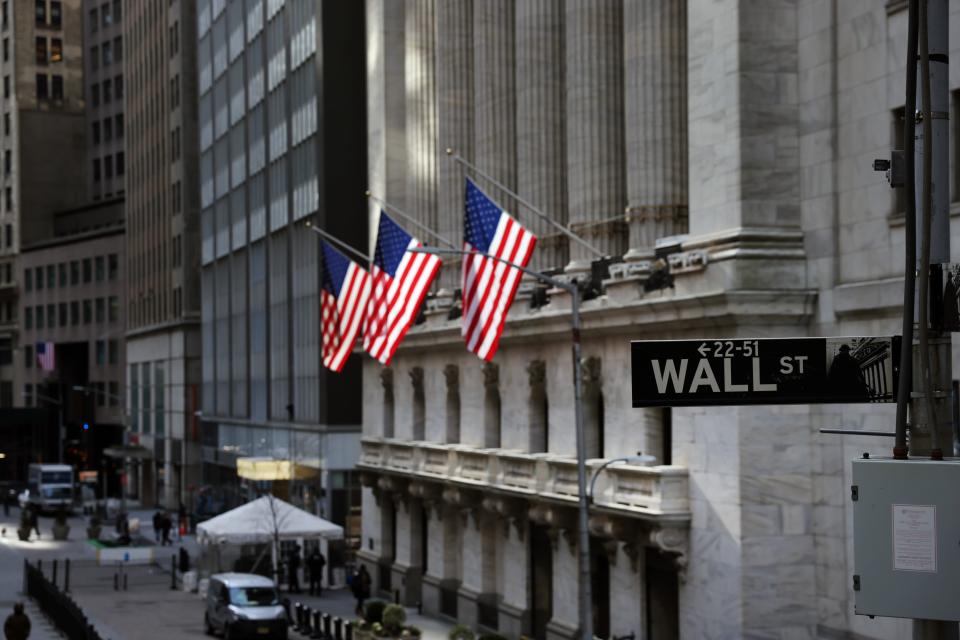Dow Jones plummets amid fears over spread of Delta variant as Biden touts economic gains

Stocks plummeted on Monday as investors sold off stocks over fears that escalating numbers of infections of the Covid-19 Delta variant would hinder the economic recovery and potentially lead to new shutdowns, mask mandates, or other restrictions.
All three major US stock indices followed their European counterparts, closing the day sharply lower, with the Dow Jones Industrial Average down 2.09 per cent, or 725 points – its worst day in nine months.
The S&P 500 fell 1.59 per cent, and the tech-heavy Nasdaq was down 1.06 per cent.
The highly contagious Delta variant, now the dominant strain across much of the world, has caused a surge in new infections, hospitalisations, and deaths – almost exclusively among the unvaccinated. The Biden administration continues to plead with Americans to take the vaccine.
Oil prices also plunged around six per cent on both worries about future demand and after an OPEC+ agreement to increase supply.
Some of the worst-hit stocks were in the travel and leisure sector, with the S&P 1500 Airline index plunging four per cent, and the S&P 1500 Hotel and Restaurant index dropping 3.1 per cent.
All 11 major sectors in the S&P 500 were deep in negative territory, with energy stocks suffering the largest percentage drop.
The US Business Cycle Dating Committee announced on Monday that the recession touched off by the coronavirus pandemic lasted only two months, ending with a “trough” reached in April 2020 just one month after the sharp drop in economic activity in March of that year.
It is the shortest US recession ever recorded, being only a third as long as the 1980 recession and a quarter as long as the downturn that followed the collapse of the bubble in technology stocks in 2001.
The rebound from the precipitous downturn in economic activity at the start of the pandemic is the fastest expansion of economic activity in 40 years, but there remains a substantial hole in the US job market.
The committee, a group of macroeconomists who assign the start and end dates of US business cycles, said that while the country had by no means returned to normal operating capacity at that point, indicators of both jobs and production “point clearly to April 2020 as the month of the trough”, with a rebound beginning in May.
Indeed, the resumption of growth was so rapid the committee said it was only “the unprecedented magnitude of the decline” that led members to consider what happened to be a recession in the first place, with a downturn typically requiring “depth, duration, and diffusion” to qualify for the label.
Approximately 22 million jobs disappeared from company payrolls in March and April of that year, an event that sparked concern about a new Depression and led Congress and the White House to approve the first of several massive relief packages to keep firms and households afloat.
During May 2020, 2.8 million people were brought back to work, and over the following year about another 15 million jobs were recovered.
Employment “reached a clear trough in April before rebounding strongly the next few months and then settling into a more gradual rise”, with incomes rising as well, the committee said in a statement released through the National Bureau of Economic Research.
Speaking at the White House on Monday morning to mark six months since he took office, President Joe Biden remained upbeat about the progress made towards a full economic recovery.
Noting that there were 60,000 jobs being created each month when he took office, Mr Biden said that now that same number of jobs are being created every three days, equalling more than 600,000 jobs per month.
“More than 3 million new jobs all told. That’s the fastest growth, I’m told, at this point in any administration’s history,” said the president.
“For all those predictions of doom and gloom, six months in, here’s where we stand: record growth, record job creation, workers getting hard-earned breaks,” he said. “Look, we’ve brought this economy back from the brink. And we designed our strategy not only to provide for a temporary boost, but to lay the foundation for a long-term boom that brings everyone along.”
Touting his administration’s economic relief and child tax credit programs, the president also underlined the importance of the passage of the bipartisan infrastructure spending proposal to ensure more sustained growth.
Mr Biden also underlined the importance of vaccinations as new infections surge across parts of the country where uptake of the vaccines has been low. Just four states account for 40 per cent of new infections.
“You know, this virus doesn’t have to hold you back any longer. It doesn’t have to hold our economy back any longer. But the only way we put it behind us is if more Americans get vaccinated,” said the president.
With reporting from Reuters
Read More
FTSE 100 closes the week with losses, Asian stocks open lower as Sensex down over 350 points
